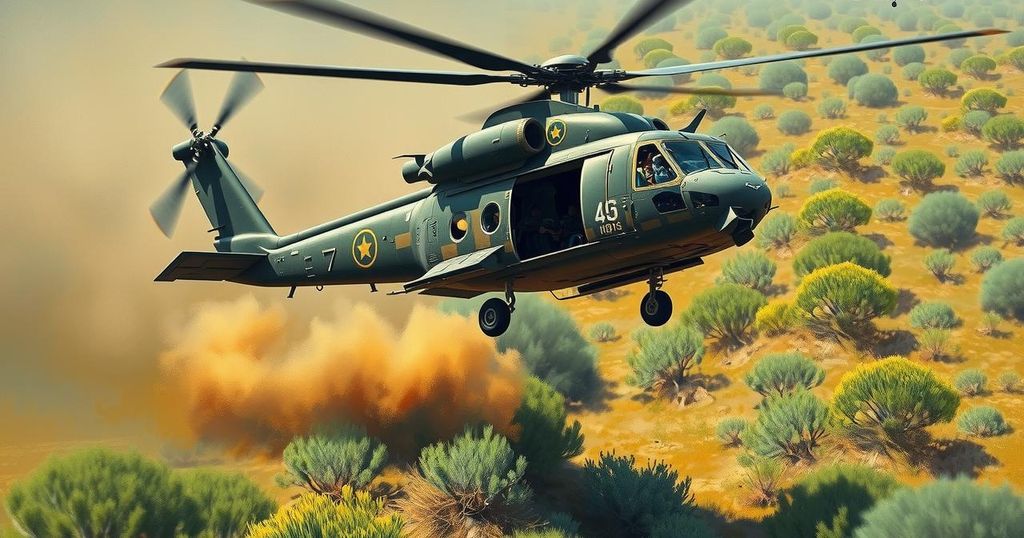UN Rescue Mission in South Sudan: A Pilot’s Harrowing Experience

Captain Serhiy Muzyka faced gunfire during a UN helicopter rescue mission in South Sudan, resulting in critical injuries and the death of a crew member. Amidst chaotic violence stemming from ongoing civil unrest, he successfully navigated the damaged helicopter to safety. The mission showcased the dangers of UN operations in conflict-stricken areas and the deep-seated issues within South Sudan’s peace agreements.
Captain Serhiy Muzyka, a 60-year-old Ukrainian helicopter pilot, faced a near-death experience during a UN rescue mission in South Sudan that turned chaotic. With 43 years of experience, including military service in Afghanistan, Muzyka encountered life-threatening gunfire while evacuating wounded soldiers from a military base in Nasir. This traumatic event marked his most memorable, though harrowing, mission.
The mission to evacuate injured soldiers became deadly when a shoot-out erupted at the base, resulting in the death of a crew member and several South Sudanese soldiers. Miraculously, despite being shot in the arm, Muzyka managed to fly the damaged helicopter to safety. Video evidence showed blood in the cockpit, emphasizing the dire situation he faced while navigating through hostile territory.
The UN had contracted Muzyka’s company, Ukrainian Helicopters, for this operation to support peacekeeping amid escalating tension in South Sudan. The region’s complex civil history, including a previous five-year civil war between President Salva Kiir and Vice-President Riek Machar, contributed to the chaos during the mission. Violations of the power-sharing agreements have fueled distrust and military confrontations in the area.
After successfully extracting ten people previously, the team returned to Nasir, expecting a routine operation. However, gunfire started as soldiers boarded the aircraft. Muzyka’s military training took over, prompting him to initiate take-off amidst the chaos. Despite multiple bullet impacts on the helicopter, he expertly maneuvered to Malakal, staying low to avoid further damage.
Muzyka faced critical operational challenges, such as a punctured fuel tank and a malfunctioning main gearbox. With the help of his crew, he continued flying at a dangerously low altitude, searching for potential emergency landing spots. They managed to stabilize the captain’s injury while navigating their way through a hostile environment.
Upon approaching Malakal, they encountered issues with the front wheel, which was damaged during the attack, yet Muzyka successfully landed the aircraft safely after a harrowing flight of 49 minutes under fire. Despite surviving the ordeal, he mourned the loss of crew member Sergii Prykhodko who succumbed to his injuries.
Post-mission, the crew received medical assistance and were later awarded a UN medal of honor, with the UN mission head highlighting the attack’s potential classification as a war crime. The traumatic experience has taken a toll on Muzyka and his crew as they grapple with their loss while being concerned about ongoing conflicts in Ukraine. Muzyka has since returned to Ukraine for treatment, expressing hope for a peaceful resolution in global conflicts while pondering his impending retirement from flying.
For further updates and news, visit BBCAfrica.com. Follow us on Twitter @BBCAfrica, on Facebook at BBC Africa, or on Instagram at bbcafrica.
Captain Serhiy Muzyka’s experience highlights the dangers faced by UN peacekeepers and the complexities of operating in conflict zones. His miraculous survival amidst life-threatening gunfire underscores the urgency and volatility of the situation in South Sudan. The tragic loss of his crew member adds to the heavy toll exacted by such operations. As peace agreements remain frail, the future of stability in the region looks uncertain.
Original Source: www.bbc.com







